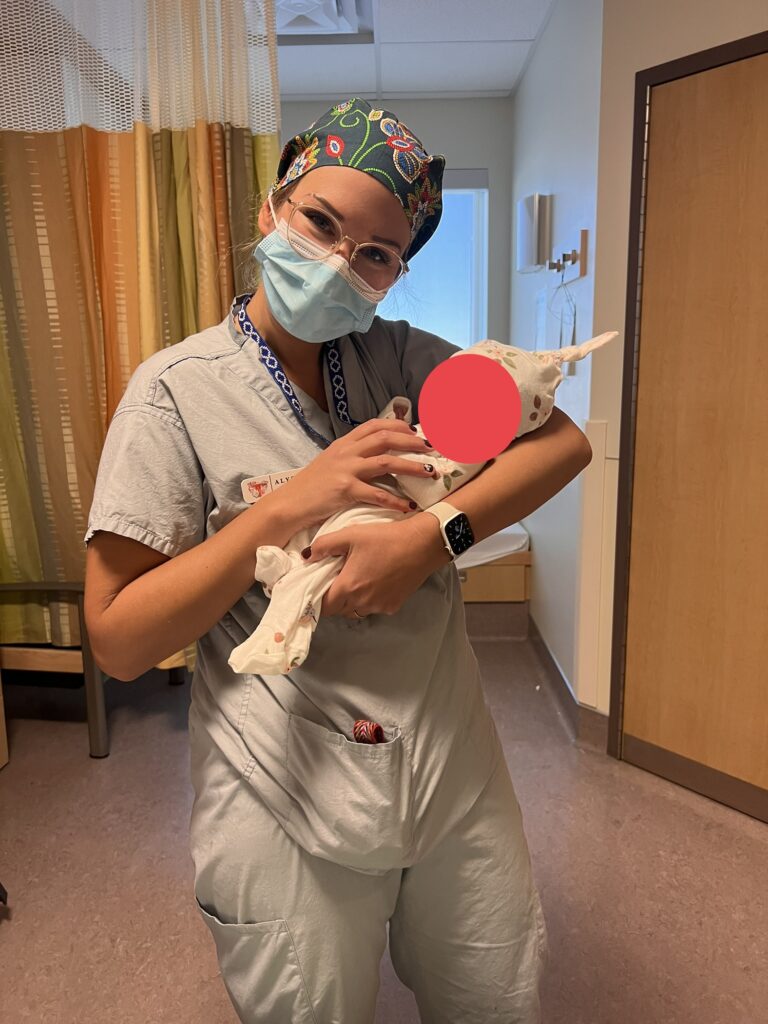Growing up in Edmonton, Alyssa Wiens characterizes her childhood as coming from very humble beginnings, with visits to the food bank being a regular part of life. Residing in a tougher neighbourhood, she recalls being chased to school by intoxicated individuals.
Alyssa credits her aunt, who is a paramedic, as being a great example of someone who had her life together and someone she strived to be like.
Despite facing adversity during her childhood, she graduated high school with excellent marks. While completing high school is an achievement for most, it holds even greater significance for Alyssa, considering that most of the members of her family hadn’t achieved the same milestone.
During a trip to Indonesia when she was 19, she witnessed a terrible accident and felt utterly helpless. Upon reflection, she realized it wasn’t the blood or emergency that scared her, but it was her lack of knowledge on how to respond or provide aid. Seeing the chaos of the accident unfold, she knew then that pursuing a career as a paramedic was what she wanted to do.
Starting her journey into healthcare as a primary care paramedic in 2006, Alyssa worked for both the City of Edmonton and City of Calgary. She enjoyed the fast-paced environment of the job and being able to make a difference by helping people.
After discovering a love of photography, she started doing family and newborn photoshoots as a hobby. Through building relationships with these mothers, she learned about all the different types of birth stories. Alyssa was fascinated by the different stories that mothers had, particularly the difference between moms who had experienced a hospital birth versus a home birth with a midwife.
It was a light bulb moment for Alyssa when both her careers collided, and she knew then that she wanted to pursue Midwifery.

“Paramedicine led me to newborn photography which led me to midwifery. What’s most important to me now is advocating for better births for Indigenous people,” Alyssa said.
Alyssa has always embraced her Metis heritage, ensuring that while pursuing her education in Midwifery, that it was shaped by collaborating with Metis mentors. She actively advocated for opportunities to work with vulnerable Indigenous communities, as it holds great significance to her.
“With Indigenous people, community is everything. It’s very important culturally to Indigenous people that they can do things like sit at the feet of elders, be able to smudge and have special lullabies that you sing.”
She’s currently enrolled at Mount Royal University and received one of three Indigenous Health Scholarships from Calgary Health Foundation for the excellence she’s shown in pursuing education in a healthcare field and involvement and dedication to her community.
“I’m honoured to be awarded an Indigenous Health Scholarship. It’s an investment in me, so that I can serve my people to the best of my ability. There’s a sense of responsibility because I’m being given this, so that I can do good things for my community.”
Alyssa graduated in April and wants to work with pregnant Indigenous women who are coming out of addiction and who have experienced involvement with child and family services. Her aim is to keep families together.
Raising two children while juggling school and being on call has been a challenge, but knowing she’s close to completion and closer to her end goal keeps her focused. Her journey to get where she is now has been arduous and she has faced racism many times.
Being Metis, she has found that she has been able to walk in two very different worlds.
“I’m quite fair, very White presenting and there’s an expectation in some settings to leave my Indigenousness at the door. The feeling that it’s not welcome here.”
There are instances where she tries to look more Indigenous because she wants those she cares for to know she is Indigenous, and also wants to signal to those that participate in racism that she isn’t an ally but an advocate for Indigenous people.
“You have to be completely immersed in the culture and community to provide appropriate care.”
Where possible, she’s tried to include her two children in her work, so they see the important work she does by caring for those that are vulnerable. She had a client who was facing food scarcity and she brought her kids to buy diapers, wipes and gifts for the family.
“It’s important for me to incorporate my kids in my career where appropriate. I want to show them, that these are our people and we can make a difference in our community together.”


